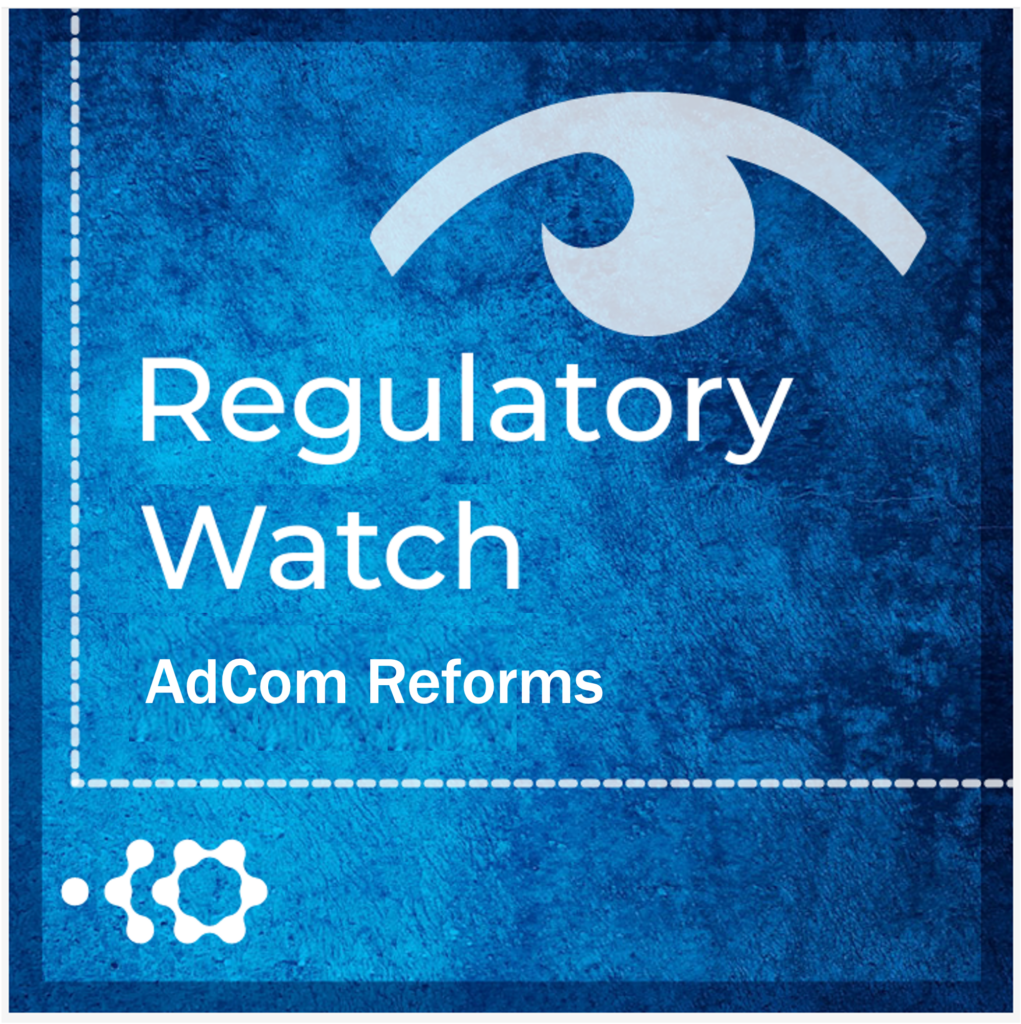AdComs: They Are a-Changin’
Changes Are Coming to Advisory Committee Meetings
Advisory Committee meetings (AdComs) are a long-standing feature of the FDA drug approval process. How and where those meetings are conducted has been evolving over the past few years, since the introduction of virtual meetings, and even more considerable reforms may be coming sooner rather than later. According to FDA Commissioner Robert Califf, the FDA is getting ready to release “systemic” changes to the Advisory Committee process.1 After months of speculation, this is the first hint that change is just over the horizon. Dr. Califf did not go into detail about specific reforms, but shared that top leaders are still working to reach an agreement. This reform effort is being led by Dr. Namandjé Bumpus, acting FDA Chief Scientist who recently replaced Dr. Janet Woodcock upon her retirement as Principal Deputy Commissioner.2
So, what is mere speculation and what is known? Keep reading to dive deeper into proposed changes to meeting conduct, what “face-to-face” means, the frequency and purpose of AdComs, and finally how the patient voice is being brought into the conversation.
Virtual Meeting Conduct
AdComs are an opportunity for the FDA to seek advice from external experts on new or supplemental drug applications, or even to solicit general expert opinions on broader topics. Traditionally, AdComs were convened in-person at the FDA White Oak facility in Silver Spring, Maryland, but the onset of the COVID-19 pandemic in 2020 forced a switch to fully virtual meetings. Although virtual meetings continued through 2023, there were 2 important changes to the virtual format. The first was an improvement of the teleconferencing platform used by FDA, and the second was the introduction of hybrid meetings instead of fully virtual participation.
In March 2023,3 the FDA switched to Zoom for the first time and required speakers to be on video—a significant change from Adobe Connect with no video option offered. The switch to the Zoom platform created a more user-friendly experience with fewer technical and audio issues and provided a virtual space where the audience and participants could feel more connected. Along with these platform and video improvements, there was a shift to hybrid meetings. More Sponsor teams were gathered in one place for the meeting and, eventually, the FDA followed suit, opting to again gather in-person at White Oak when possible. Committee members and Open Public Hearing (OPH) participants still participated virtually.
Virtual versus In-Person
For those who have attended in-person AdComs in the past, you can appreciate how difficult it is to recreate the energy and close collaboration afforded by those meetings in the virtual space. It’s also difficult for Sponsors to “read the room” during a virtual meeting. Because of that, many say that a continuation of virtual or hybrid meetings is a detriment to all parties involved. For others, the flexibility offered by virtual meetings is truly valuable. Virtual meetings do not require travel, which for a busy panel member could mean they don’t have to cancel clinic. This could translate into greater availability of expert panelists and more robust discussion, benefiting everyone. Virtual meetings also offer enhanced accessibility to OPH participants, where participation in-person at the FDA might otherwise be a barrier. This increased flexibility and accessibility to the public has been praised and is expected to continue, at least in part.
During an Alliance for a Stronger FDA webinar,4 Dr. Bumpus stated that she wants to make sure the logistics for panel members remain as simple as possible to maintain the expert panelists FDA needs. She remains in favor of hybrid meetings but says that “…we’ll see different formats…for different meetings…but there will be a mix.” Dr. Bumpus also highlighted the importance of maintaining an online option; she wants to ensure “…a robust discussion, while also including opportunities for more folks to engage.“
There has been speculation about a return to face-to-face meetings, but the FDA has redefined what “face-to-face” means. An update released by the agency in mid-December 20235 clarifies that “face-to-face” includes in-person meetings with everyone in the same room AND virtual meetings with both audio and visual communication. Intriguingly, the FDA also shared in that update that Sponsors could request in-person meetings starting at the end of January 2024. It is noteworthy to highlight that an in-person meeting was held at a DC area hotel in early February,6 and it appeared there were no virtual participants. Currently, it remains the only in-person meeting on the 2024 AdCom calendar.7
Frequency of Meetings
There has been much speculation that FDA plans to be more targeted in their approach and convene fewer AdComs in the future. However, more AdComs were held in 2023 than in any year since 2018.8 Twenty-nine meetings were held in 2023, with 25 devoted to new drugs or biologics or the status of an Accelerated Approval. Does this reflect a trend to increase the use of AdComs or is it simply a clean-up of COVID-related delays?
So far, there has been a slow start to AdComs in 2024,9 with only 2 meetings scheduled to review new drug applications through March. It is not known whether the slow start to this year is due to the current PDUFA calendar or other internal changes at FDA, but knowing that the agency is committed to reforming the AdCom process, either is reasonably likely. So this begs the question, will we see a change in the frequency of AdComs convened moving forward?
What Does FDA Need to Get From AdComs?
The conduct and tenor of AdComs may also be changing. Commissioner Robert Califf would like to deemphasize voting questions in favor of more discussion and less voting moving forward,10 noting that votes are not always needed to get the necessary information from committees. According to Dr. Califf,11 “the purpose of the advisory committee is not to produce gladiator votes, so people say the FDA does not agree with its advisory committees. The purpose is to get advice, and the best advice is not whether this drug should be approved. That decision should be made by full time civil servants.” Others at the FDA, including Richard Pazdur, Director of the Oncology Center of Excellence, disagree and instead stress the need to vote in order “to make a binary decision [on] whether to or not to approve.”12
Deputy Commissioner Bumpus has a less rigid view on voting questions and prefers an overall theme of flexibility, indicating that the most important part of holding an Advisory Committee meeting is gathering information that informs decision-making. At a recent webinar,4 Dr. Bumpus stated that voting should be on an as-needed basis and that she would like to leverage AdComs to solicit advice earlier in the clinical development process. This emphasis on flexibility is also backed by the recently retired Janet Woodcock,13 who doesn’t like “the courtroom-style drama” and has suggested that AdComs be utilized earlier in the drug approval process, such as during clinical trial design, rather than to critique the data only at the end of the process.
Indeed, AdComs in 2023 already began to deemphasize voting questions and emphasize discussion. The feeling was that what the committee said during discussion became almost more important than how the vote turned out. Even so, there were still 23 meetings last year that had voting questions,8 leaving only 2 meetings that focused solely on discussion. Even though voting remained prevalent, committee chairs urged panel members to discuss their opinions before voting and to elaborate on their votes instead of simply reading their votes into the record. This is a productive evolution in the conduct of AdComs.
Increasing Efforts to Give Patients a Seat at the Table
In addition to evolving AdCom objectives, the FDA has been making an effort to increase patient engagement in the regulatory process, inviting patient opinions and ideas in an effort to increase understanding of how diseases affect them and what outcomes would be meaningful to them.
The FDA has a variety of patient-engagement initiatives14 such as the Patient Engagement Collaborative (PEC),15 Patient Listening Sessions,16 and the Patients Matter Video Series.17 The PEC is a joint project between the FDA and the Clinical Trials Transformation Initiative (CTTI) where the patient community (PEC members), FDA, and CTTI can discuss a variety of topics of interest, such as improving communication, education, and patient engagement related to medical product regulation. The PEC is not considered an Advisory Committee but may guide some FDA activities.
Another way that FDA is engaging patients and their advocates is through Patient Listening Sessions. These sessions are informal, nonregulatory, nonpublic meetings focused on the lived experience of patients. These sessions help inform medical product development, clinical trial design, and patient preferences, and help the FDA better understand what is most important to different patient communities. These sessions are also an opportunity for the FDA to connect with under-represented communities. At an Endocrinologic and Metabolic Drugs Advisory Committee meeting in June 2023,18 the FDA opening remarks included comments about the patient listening session they held in 2019 for the rare disease for which the drug under discussion was indicated. This is one example where these listening sessions are coming into play during AdComs.
Finally, the Patients Matter Video Series aims to educate patients and caregivers about FDA patient-engagement efforts to encourage more participation and drive increased involvement in these programs. The videos explain different engagement opportunities, such as the Patient Listening Sessions, and other parts of the regulatory process.
Rare disease research is an area that has been energized by increased patient engagement (see our upcoming post on Rare Disease Day on February 29). In fact, FDA Patient Affairs partners with the National Organization for Rare Disorders. Back in December, the FDA held a virtual public meeting19 in collaboration with Duke University’s Duke-Margolis Center for Health Policy aimed at improving patient community engagement in the development of rare disease treatments.
While not a comprehensive list, these initiatives to give patients a seat at the table are broad and another aspect of FDA’s evolving efforts to engage and inform the public.
Change Upcoming
Regardless of what changes the FDA ends up implementing, discussions so far suggest that they are being thoroughly considered and with the best intentions. Leaders at the FDA have demonstrated their goal is to keep patients’ needs top of mind through patient-engagement efforts and to get the most useful advice from advisory committees through reforms to AdComs. While much speculation remains, it is clear that no matter what the change may be, change is indeed coming.
References
- Brennan Z. ‘Systemic’ changes coming to advisory committee process, FDA commissioner says. Endpoints News. January 31, 2024. Accessed February 9, 2024. https://endpts.com/systemic-changes-coming-to-advisory-committee-process-fda-commissioner-says/
- Wilkerson J. FDA chief scientist to replace Woodcock. STAT. November 29, 2023. Accessed February 9, 2024. https://www.statnews.com/2023/11/29/fda-namandje-bumpus-woodcock/
- US FDA. Advisory Committee Calendar. March 28-29, 2023: Joint Meeting of the Drug Safety and Risk Management Advisory Committee and the Dermatologic and Ophthalmic Drugs Advisory Committee Meeting Announcement. Accessed February 9, 2024. https://www.fda.gov/advisory-committees/advisory-committee-calendar/march-28-29-2023-joint-meeting-drug-safety-and-risk-management-advisory-committee-and-dermatologic
- Alliance Webinar Series & Alliance Testimony: 2023. Transcript of Webinar with FDA Chief Scientist Dr. Namandjé Bumpus. August 2, 2023. The Alliance for a Stronger FDA. Accessed February 9, 2024. https://www.strengthenfda.org/events; https://acrobat.adobe.com/id/urn:aaid:sc:VA6C2:990a158b-2de0-4f0c-8a0b-84e21744ee0d
- US FDA. Update on In-Person Face-to-Face Formal Meetings with FDA. December 18, 2023. Accessed February 9, 2024. https://www.fda.gov/industry/prescription-drug-user-fee-amendments/update-person-face-face-formal-meetings-fda
- US FDA. Advisory Committee Calendar. February 6, 2024: General Hospital and Personal Use Devices Panel of the Medical Devices Advisory Committee Meeting Announcement. February 9, 2024. Accessed February 9, 2024. https://www.fda.gov/advisory-committees/advisory-committee-calendar/february-6-2024-general-hospital-and-personal-use-devices-panel-medical-devices-advisory-committee
- US FDA. Advisory Committee Calendar. February 9, 2024. Accessed February 9, 2024. https://www.fda.gov/advisory-committees/advisory-committee-calendar
- Senak M. The Year in AdComms – A Look Back at 2023. Eye on FDA. December 7, 2023. Accessed February 9, 2024. https://eyeonfda.com/2023/12/the-year-in-adcomms-a-look-back-at-2023/
- Brennan Z. Where are the adcomms? FDA has scheduled no drug or biologic meetings for 2024 so far. Endpoints News. January 3, 2024. Accessed February 9, 2024. https://endpts.com/no-fda-drug-or-biologic-adcomms-scheduled-for-2024-so-far-calendar-shows/
- Brennan Z. No more FDA adcomm votes? Reforms brew as new research highlights decline in meetings. Endpoints News. July 7, 2023. Accessed February 9, 2024. https://endpts.com/no-more-fda-adcomm-votes-reforms-brew-as-new-research-highlights-decline-in-meetings/
- Eglovitch JS. Califf: Advisory committee meeting structure needs an overhaul. Regulatory Focus. February 14, 2023. Accessed February 9, 2024. https://www.raps.org/news-and-articles/news-articles/2023/2/califf-advisory-committee-meeting-structure-needs
- Chen A. FDA oncology head wants advisory panels to keep voting on new drugs. STAT. November 29, 2023. Accessed February 9, 2024. https://www.statnews.com/2023/06/05/fda-cancer-richard-pazdur-voting-new-drugs/
- Brennan Z. Exit interview: FDA legend Janet Woodcock’s thoughts on the agency and its controversies. Endpoints News. January 29, 2024. Accessed February 9, 2024. https://endpts.com/qa-fda-legend-janet-woodcocks-thoughts-on-the-agency-and-its-controversies/
- US FDA. FDA Patient Engagement Overview. September 14, 2020. Accessed February 9, 2024. https://www.fda.gov/patients/learn-about-fda-patient-engagement/fda-patient-engagement-overview
- US FDA. FDA Patient Engagement Collaborative. January 11, 2024. Accessed February 9, 2024. https://www.fda.gov/patients/learn-about-fda-patient-engagement/patient-engagement-collaborative
- US FDA. FDA Patient Listening Sessions. January 23, 2024. Accessed February 9, 2024. https://www.fda.gov/patients/learn-about-fda-patient-engagement/fda-patient-listening-sessions
- US FDA. Patients Matter Video Series. February 7, 2024. Accessed February 9, 2024. https://www.fda.gov/patients/learn-about-fda-patient-engagement/patients-matter-video-series#FDA%20Patient%20Listening%20Sessions:%20Community%20Perspectives
- US FDA. Advisory Committee Calendar. June 28, 2023 Meeting of the Endocrinologic and Metabolic Drugs Advisory Committee Meeting Announcement. February 2, 2024. Accessed February 9, 2024. https://www.fda.gov/advisory-committees/advisory-committee-calendar/june-28-2023-meeting-endocrinologic-and-metabolic-drugs-advisory-committee-meeting-announcement
- Chapman M. FDA meeting on Thursday to focus on improving patient engagement. AADCNews. December 13, 2023. Accessed February 9, 2024. https://aadcnews.com/news/fda-meeting-thursday-focus-rare-disease-patient-engagement/

Kathryn M. Madalena, MS, PhD
Assistant Scientific Director, Scientific Services
Kathryn provides scientific support for content development and helps sponsor teams prepare for regulatory interactions and FDA advisory committee meetings across a broad range of therapeutic areas. She is a neuroscientist by training with specializations in neurotrauma, neuroendocrinology, and neuroimmunology. She completed both her MS and PhD in Neuroscience at The Ohio State University.
Connect with Kathryn on LinkedIn.

